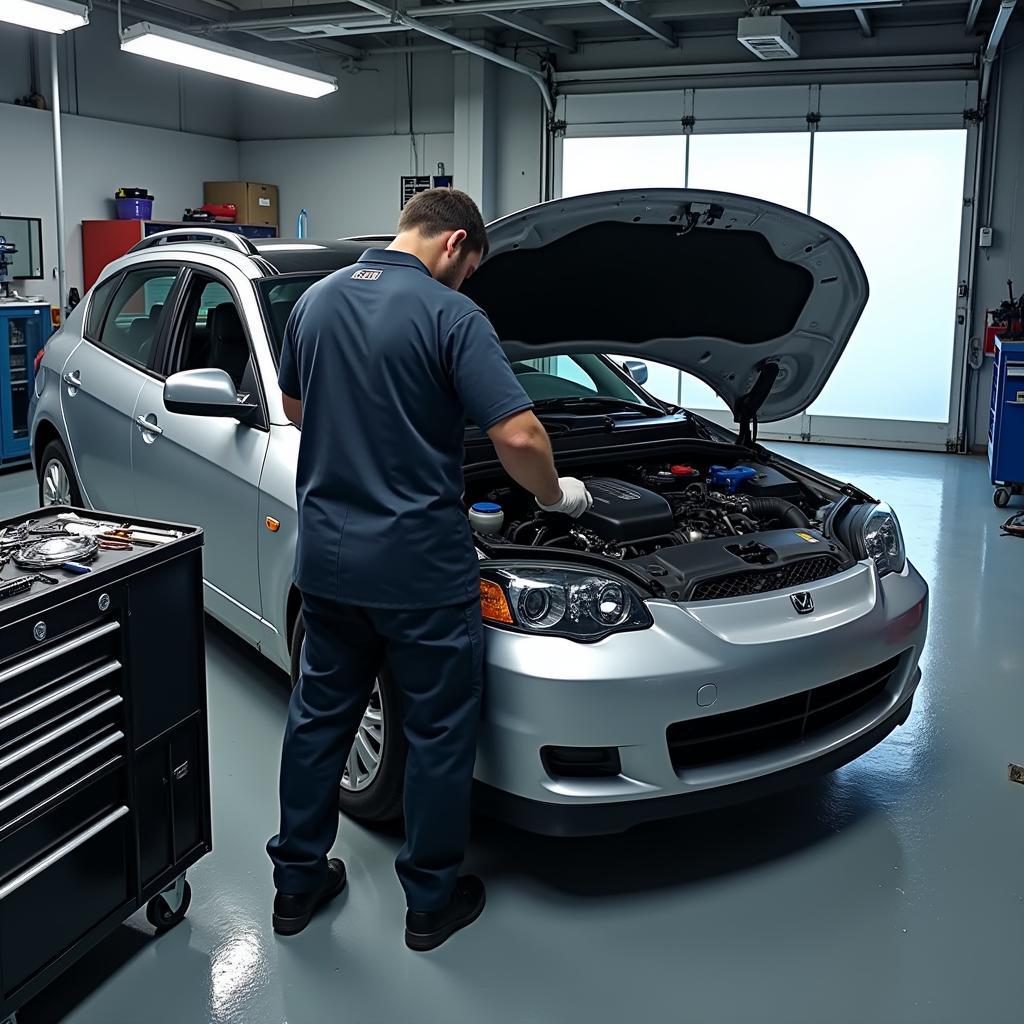When You Should Service Your Car: A Comprehensive Guide
Keeping your car in tip-top shape requires regular servicing. But when exactly should you service your car? Understanding the answer to this question can save you money, prevent breakdowns, and ensure your safety on the road. Let’s dive into the essential guidelines for car servicing.
Why Car Servicing Matters
Before we delve into the specifics of when to service your car, let’s understand why it’s crucial.
- Safety First: Regular maintenance ensures all components of your car are working correctly, significantly reducing the risk of accidents caused by mechanical failures.
- Increased Lifespan: Just like any machine, your car benefits from regular check-ups. Servicing helps identify and address minor issues before they escalate into major, costly repairs, ultimately extending the lifespan of your vehicle.
- Optimal Performance: Regular oil changes, filter replacements, and tune-ups keep your engine running smoothly, optimizing fuel efficiency and minimizing harmful emissions.
- Warranty Protection: Adhering to the manufacturer’s recommended service schedule is often a requirement for maintaining your car’s warranty.
Deciphering Service Intervals: Time vs. Mileage
The golden rule of car servicing is to follow the manufacturer’s recommended service schedule outlined in your owner’s manual. However, this schedule often provides two sets of intervals: time-based and mileage-based.
- Time-Based Intervals: These intervals dictate servicing your car every six months or a year, regardless of how much you drive. This is essential because certain fluids and parts degrade over time, even with minimal use.
- Mileage-Based Intervals: These intervals suggest servicing at specific mileage milestones, such as every 5,000, 10,000, or 15,000 miles. These intervals primarily focus on components that experience wear and tear based on usage.
So, which interval should you follow? The answer is both. It’s best to service your car based on whichever interval comes first. For instance, if your car is due for an oil change every 6 months or 5,000 miles, and you’ve only driven 2,000 miles in seven months, it’s still time for an oil change.
Recognizing the Signs: When Your Car Needs Attention
While adhering to the service schedule is crucial, your car may occasionally require attention between scheduled services. Here are some telltale signs:
- Warning Lights: Never ignore illuminated warning lights on your dashboard, such as the check engine light, oil pressure light, or battery light.
- Unusual Noises: Strange sounds like grinding, squealing, knocking, or clicking often indicate a problem that needs immediate attention.
- Fluid Leaks: Puddles of fluid under your car, especially if colored (oil, coolant, brake fluid), require prompt inspection.
- Changes in Performance: Noticeable changes in your car’s acceleration, braking, steering, or fuel efficiency could signify underlying issues.
- Vibrations or Pulling: Excessive vibrations, especially at certain speeds, or pulling to one side while driving, could indicate tire or alignment problems.
If you encounter any of these signs, it’s crucial to consult a qualified mechanic as soon as possible.
Factors Influencing Service Frequency
Besides time and mileage, several factors can impact how often your car requires servicing:
- Driving Conditions: Frequent driving in harsh conditions, such as extreme temperatures, heavy traffic, dusty environments, or off-road terrains, can accelerate wear and tear, necessitating more frequent servicing.
- Driving Style: Aggressive driving habits like rapid acceleration, hard braking, and high-speed driving can put additional stress on your car’s components, leading to more frequent service needs.
- Vehicle Age and Condition: Older cars or those with pre-existing conditions may require more frequent servicing and preventative maintenance.
 Scheduling a Car Service Appointment
Scheduling a Car Service Appointment
Types of Car Services: What to Expect
Car services are typically categorized based on the mileage or time intervals. Here’s a general overview:
- Basic Service: Usually performed every 5,000-10,000 miles or 6 months, it includes an oil change, oil filter replacement, and a visual inspection of key components.
- Intermediate Service: Typically done every 15,000-30,000 miles or 12 months, it covers everything in a basic service, plus additional inspections and replacements like air filters, spark plugs, and brake fluid.
- Major Service: Recommended every 60,000-90,000 miles or 2-3 years, this comprehensive service includes everything from previous service levels and more in-depth checks of the engine, transmission, suspension, and other vital systems.
Choosing the Right Car Service Provider
When it comes to entrusting your car to a service provider, you have several options:
- Dealerships: Offer specialized knowledge of your car’s make and model, often using original equipment manufacturer (OEM) parts. However, they tend to be pricier.
- Independent Garages: Provide a wider range of service options and often offer more competitive pricing.
- Chain Service Centers: Offer convenience and standardized services at transparent pricing.
“Finding a trustworthy mechanic is like finding a good doctor,” says John Smith, Senior Automotive Technician at XYZ Auto Repair. “You want someone who is knowledgeable, experienced, and genuinely cares about your car’s well-being.”
 Experienced Car Service Technician
Experienced Car Service Technician
Car Servicing FAQs
Q1: Can I service my car myself?
While some basic maintenance tasks can be performed at home, it’s generally recommended to leave more complex services to qualified professionals.
Q2: What happens if I delay or skip car servicing?
Delaying or skipping servicing increases the risk of breakdowns, reduces fuel efficiency, and could void your car’s warranty.
Q3: How long does a car service typically take?
Service time varies depending on the type of service and the condition of your vehicle. Basic services may take a few hours, while major services could take a full day or more.
Conclusion
Understanding when and why to service your car is paramount for its longevity, safety, and optimal performance. By following the manufacturer’s recommendations, being attentive to warning signs, and choosing a reliable service provider, you can enjoy many miles of worry-free driving. Remember, preventative maintenance is always a smarter investment than costly repairs down the road.
Need more guidance on where to service your new car? Explore our article on “where should you service you new car” for valuable insights. You can also learn more about the crucial reasons behind car servicing in our informative piece: “why you should get your car serviced“
For personalized assistance and expert advice on all your car service needs, don’t hesitate to reach out to us via WhatsApp: +1(641)206-8880, or Email: [email protected]. Our dedicated customer support team is available 24/7 to assist you.

